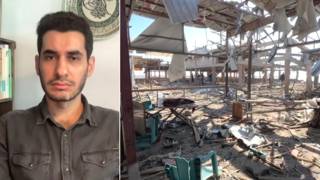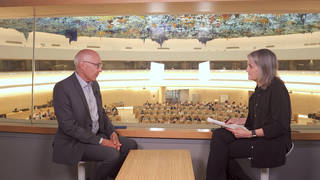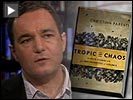
Guests
- Christian Parenticontributing editor at The Nation, author of several books, most recently Tropic of Chaos: Climate Change and the New Geography of Violence.
In part two of our conversation with journalist Christian Parenti, he discusses his recent article, Nuclear Hubris: Could Japan’s Disaster Happen Here?, about what the meltdown of three nuclear reactors in Japan means for the expansion of the nuclear power industry United States. “I think its important to problematize atomic power, because some in the green movement look to it as a solution,” says Parenti. “But there’s no way that this economy can create enough power from atomic energy in a cost-efficient manner in the time necessary.” Parenti argues the focus on developing atomic power diverts funds from the transition to clean technology and pushes the world closer to global warming — a topic he explores in his new book, Tropic of Chaos: Climate Change and the New Geography of Violence.
AMY GOODMAN: Our guest is Christian Parenti. He has a new book out. It’s called Tropic of Chaos: Climate Change and the New Geography of Violence_. We have a violence”>chapter on our website at democracynow.org. And in this part two of our conversation, Christian, you wrote a very interesting piece in The Nation magazine right after Fukushima happened, “Nuclear Hubris: Could Japan’s Disaster Happen Here?” I mean, we’re talking about three of the four nuclear reactors in Japan experiencing full meltdowns. What does this mean for nuclear power?
CHRISTIAN PARENTI: It could happen here, definitely. I mean, we have plants of the exact same design, such as Vermont Yankee. The plants aren’t required to have backup systems for their spent fuel pools. And now we see these flooding, these two plants getting flooded in the Midwest, which is, you know, the exact same scenario practically—not a tsunami, but a flood—of how this thing could go down.
And I think it’s important to really problematize atomic power, because some in the green movement look to it as a solution. They think that this will be the magic bullet. But even—putting aside the dangers, even in the terms that some people argue for it, there’s no way that this economy can create enough power from atomic energy in a cost-efficient manner in the time necessary. And the more that money goes towards atomic power, the less goes towards a transition to clean technology. The Nuclear Regulatory Commission says that the new fourth generation nuke plants that everyone lauds aren’t going to come online for another, I think it’s 12 years. Not a single nuke plant in this country has been built on budget or on time. So that’s highly unrealistic.
And what’s really going on, beneath this discussion about the future, is the present fleet of plants, that were designed to last for 40 years, have almost all been getting uprates and relicenses. And uprate is when they get to run at 120 percent of their intended design capacity, and they’re extending their licenses for 60 years. And the Nuclear Regulatory Commission is essentially rubber-stamping this, again and again and again. And it’s begging for some sort of calamity. And the firms that own these, frequently, through deregulation, the stranded costs of the plants have been paid off by the public, by the government. So these plants are now just cash cows. They’re like money presses. And so, of course these companies, like Entergy, want to run them as far as they can into the future, because it’s almost all profit, because they didn’t really have to pay for the debts they incurred.
JUAN GONZALEZ: And, of course, the Associated Press report in recent weeks, the series about the major problems at many of these plants, as you’re saying, that were—whose power was increased and the problems with corrosion of pipes—
CHRISTIAN PARENTI: Mm-hmm.
JUAN GONZALEZ: —and safety problems that have been largely ignored, with the Nuclear Regulatory Commission just sort of redefining what is a safe level, very much like what was happening in Japan after Fukushima in terms of exposure. Yet, the Obama administration—not just some green advocates, but the Obama administration—continues to see nuclear power as part of the solution for energy independence and moving away from fossil fuels.
CHRISTIAN PARENTI: Mm-hmm. Yeah, we now know that most of these plants seem to be leaking tritium. None of them have workable evacuation plans, and so they have been allowed to not—to go forward, get relicensed, without these evacuation plans. You know, a lot of these places, plants were built in the countryside. They’re now surrounded by suburbs. It would be impossible to evacuate them. And Obama, as we all know, is—
AMY GOODMAN: And Indian Point is 50 miles from New York City.
CHRISTIAN PARENTI: Yeah, and Oyster Creek in central—southern New Jersey, surrounded—30 miles from Philadelphia, surrounded by suburbs, that you can barely drive through on a good day. Yeah, and Obama, from the beginning, we saw he was in the pocket of the nuke industry, very close to Exelon, which is a major operator of plants, and David Axelrod worked for Exelon. I think—
AMY GOODMAN: Rowe, the head of Exelon, is on the committee that President Obama has established to look at nuclear as part of the solution.
CHRISTIAN PARENTI: Mm-hmm. I mean, another thing that may or may not be intentional but is a kind of political function of this whole discourse is that the more we talk about the feasibility of atomic power—because it’s not going to get built. These things are so expensive that Wall Street is not getting behind them. The more we talk about them, the less we’re talking about closing coal plants and moving to clean technology. So the fossil fuel industry benefits from this—this red herring of the future of nukes.
AMY GOODMAN: What about this latest news, Greenpeace revealing one of the world’s most prominent scientific figures to be skeptical about climate change has admitted to being paid more than a million dollars in the past decade by major U.S. oil and coal companies?
CHRISTIAN PARENTI: Yeah.
AMY GOODMAN: His name is Willie Soon. He works as an astrophysicist at the Harvard-Smithsonian Center for Astrophysics. Since 2001, he’s received money from Exxon Mobil, American Petroleum Institute, Koch Industries, along with Southern, one of the world’s largest coal-burning utility companies.
CHRISTIAN PARENTI: Right. And he claims that that had zero effect on his research. You know, the late Robert Fitch, who was a writer and academic in the New York area, said that vulgar Marxism explains about 90 percent of what goes on in reality. I mean, and that is just a case of like, you know, vulgar Marxism. The industry pays this guy, and he says exactly what they want. I mean, the story is its own critique. It’s appalling.
AMY GOODMAN: You grew up in the shadow of Vermont Yankee?
CHRISTIAN PARENTI: I did. And that’s part of why I’m concerned about this is because, growing up, this was a real issue. And I would protest it at the gates of Vermont Yankee. And I’m aware of how old and rickety it is. And I know Peter Shumlin, who’s the governor of Vermont, who is fighting to close that plant, which would be one of—the reason the Vermont legislature has the power to shut it is because of the protests when I was growing up, a small child. That was the compromise. It’s the only plant in the country where the state has a say over the relicensing. And the company, Entergy, is having secret meetings with the NRC to get around this. They’re organizing in Vermont towns, spending lots of money to spread lies about the economic costs of cutting this.
AMY GOODMAN: Well, they’ve sued to say that the state legislature of Vermont should not be able to have a say over what Entergy does, this private corporation.
CHRISTIAN PARENTI: Yeah, yeah, which is a violation of the original agreement.
JUAN GONZALEZ: And you also have now Governor Cuomo here in New York talking about that—moving more aggressively on the issue of whether the permits for the Indian Point plant will be renewed when they come up in the next few years.
CHRISTIAN PARENTI: Mm-hmm. Yeah, I mean, it’ll be interesting to see what happens with the crisis at Los Alamos and these plants that are inundated with water right now. And as, you know, you were mentioning off air, or maybe on air, that, you know, there’s no reporters there from the local papers. So, you know, we have yet to see how this crisis will play out. And hopefully it will galvanize people like Shumlin and other governors who are having questions about this, and maybe even, you know, Jaczko at the Nuclear Regulatory Commission will realize that this is too great a risk to take.
AMY GOODMAN: We want to thank you very much for being with us, Christian Parenti. Tropic of Chaos is his new book, Climate Change and the New Geography of Violence_. You can go to our website to read a violence”>chapter of Tropic of Chaos, democracynow.org. Thanks so much.












Media Options